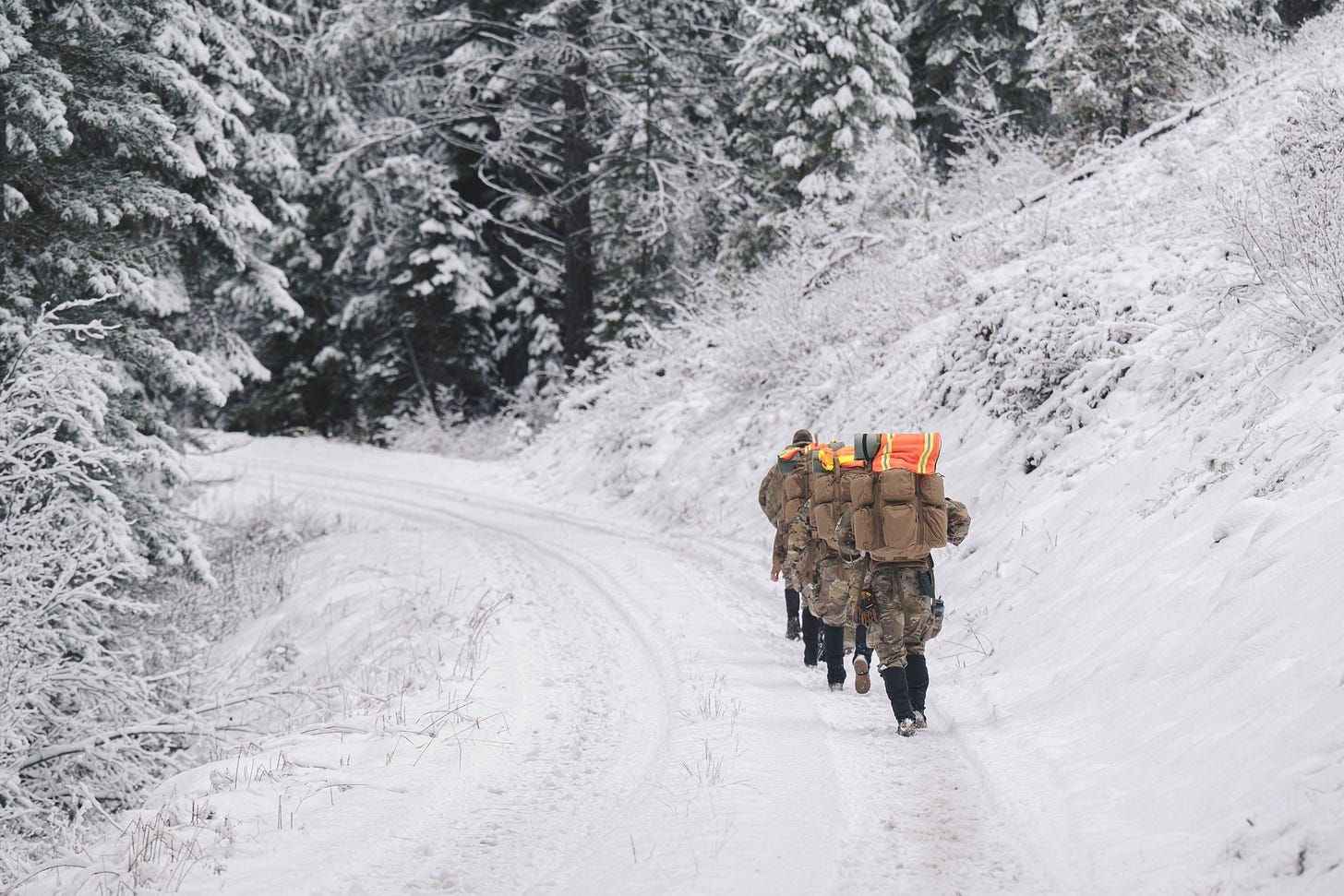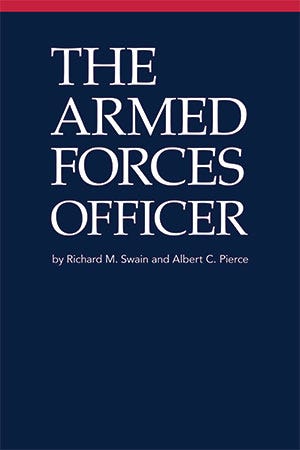Note: Much of what I’ve written thus far and shared with you here has focused on the intersection of social science, philosophy, and, to some extent, theology as they pertain to how we humans navigate the hardship and uncertainty of life. That will continue. Another important part of how we navigate a certain segment of life’s crucibles involves how we conceptualize, operate, and interact with the military. Why? Click here for an explanation. So, I’m exploring that once in a while via a ten-part series unpacking ideas from the book The Armed Forces Officer.
Below is part 3 of 10 (click here for all posts on this topic). As always, these are my views, and they do not necessarily represent the views of the U.S. Department of Defense or its components.
No One Wakes Up Awesome
A guiding premise or assumption in the world of personal and professional development is that while our biology matters, we can actually get better at various tasks over time through effort and learning. Taken a step further, there’s the assumption that effort and learning can make us better people.
That’s not to say that our genes don’t have something to do with our abilities or personality nor that the innate parts of our abilities and personality don’t matter. We all have various differences that make us who we are. And those differences have something to do with our interests, career choices, and effectiveness.
At the same time, there’s a great deal that we can do to become more knowledgeable, more skilled, more virtuous as humans. If we aspire to do something well—or simply to be good humans living a good life—we should focus our efforts on continual improvement. No one wakes up awesome; it takes a lifetime of intentional practice, work, and experience to hone who we are.
These assumptions apply to all of us. For people who choose to enter into a specific profession—something that’s both an occupation and a call to be someone a bit different in the service of others—these assumptions seem particularly relevant because part of the the very nature of the profession is a call to embody a certain set of characteristics deeply.
These assumptions also seem to undergird the ideas of values, virtue, and character as articulated in “The Officer in the Profession of Arms,” the third chapter of The Armed Forces Officer. And for both military officers and others alike, I suggest that these ideas all matter for a variety of reasons, not the least of which is that having values, virtue, and character can assist us greatly in times of adversity.

Values
What do you really care about? What guides you when there’s no clear path ahead or when you’re stuck between equally uncertain or ambiguous options? In these types of situations, your values are highly useful, helping to cut through the “fog of war” and clarify what you should do.
Experts on decision-making agree. One such expert is Neil Shortland, whom I once interviewed about this. Neil is a cognitive psychologist who studies decision-making, and here’s what he said:
What I always say to people is that you have to know your values and be guided by your values. Because if you make a decision that violates your values—because you prioritized someone else’s values—you are the one that’s going to suffer … I'm not saying every decision but the extreme decisions that truly test your values. That's the link that we're seeing with a lot of people [who suffer] moral injury, trauma, and just struggling to live with the decisions that they’ve made. And that’s as important as making a decision … being able to make it, be OK with the outcome, good or bad, and live with it. And a lot of that comes to be guided by your values.
Be it in the boardroom or on the battlefield, in the trenches of adult life or amid family crises, having strong values matters. For military officers and others who are likely to face difficult circumstances with limited information and time pressure (maybe that describes all of us at various points?), therefore, it makes sense to devote consistent time and effort to articulating and understanding one’s values.
Aside from one’s personal values, the branches of the U.S. military have specific organizational values that serve as continual reference points or consistent guideposts for behavior. These values not only remind service members of what they should care about; they also serve as a foundation for norms about what’s acceptable and what’s not. Across the six branches of the U.S. armed forces, there’s considerable similarity in core values. Without elaborating into the details, here they are:
Navy and Marine Corps: honor, courage, commitment
Army: loyalty, duty, respect, selfless service, honor, integrity, personal courage
Air Force: integrity first, service before self, excellence in all we do
Space Force: character, connection, commitment, courage
Coast Guard: honor, respect, devotion to duty
That’s all fine, but the real challenge of course is to transform such concepts into behaviors and patterns of thinking. Otherwise, they remain words and sets of ideas that do nothing. It’s interesting (at least to me) to note that for the military, these core values are not suggestions.
There’s no invitation to make up your own alternative core values when it comes to your job in uniform. Instead, there’s a self-sacrificial expectation that one will adopt a set of common core values as a way to connect with and collectively guide an organization in a way that upholds a set of norms for personal and professional conduct. And I suggest that there’s no expectation inherent in these values that that one becomes an unthinking robot; to the contrary, the values themselves set the conditions for a collective approach toward thoughtful action, responsibility, and accountability.
Virtue
It’s easy for values—perhaps especially when they are formal values of an organization—to become taken-for-granted words stripped of their importance and practical relevance for guiding one’s behavior. As Richard Swain and Albert Pierce write in The Armed Forces Officer,
Knowledge of values is not enough. It is the will to act in accordance with them that transforms a value into a virtue. The profession of arms demands constant self-awareness, self-reflection, and self-criticism of the times and places where better, more virtuous choices should have been made. (p. 31)
Thinking more about the three sentences quoted above, it seems apparent to me that such an observation isn’t limited to the profession of arms. Although it’s beyond the scope of what I’m trying to summarize here, it seems that living a good life also “demands constant self-awareness, self-reflection, and self-criticism of the times and places where better, more virtuous choices should have been made.”
Drawing upon ancient notions going back to Aristotle, Swain and Pierce highlight the importance of practice and habituation in the development of virtue. We become better through repetition, through guidance from others, and through learning from our mistakes. Becoming a virtuous person is a lifelong journey.
Swain and Pierce further suggest that four basic virtues are of particular importance for military officers: discipline, courage, competence, and self-sacrifice (or selfless service). Discipline includes the submission to the Constitution and the obedience to legitimate authority. This idea of obedience brings up a host of notable issues, such as the balance between following orders and expressing dissent. On this topic, Swain and Pierce write,
The superior who values the perspective of subordinates must create a space in which it is possible for subordinates to express doubt or disagreement without prejudice, and without the superior fearing a loss of authority … Frequently, discourse can produce better-informed and more nuanced solutions. At least it can enhance mutual understanding. For the follower, forthright communication is an obligation of loyal subordination and discipline ...
Subordinates who challenge their superiors should be self-aware, prepared to acknowledge their understanding might be incomplete or misinformed, accept that their motivations may be misunderstood, and offer their judgments not as indictments but as an honest attempt to further the common effort. (pp. 37-38)
Courage includes both its physical and moral components, which we can understand as the willingness to engage in the dangerous business of warfare as well as the strength to speak the truth or do the right thing even when it’s difficult.
Competence involves the skills and knowledge to do one’s job at a high level of effectiveness. If we’re to consider competence as a virtue built through habit, then it naturally follows that lifelong learning for all people at all levels is necessary.
Self-sacrifice or selfless service, Swain and Pierce suggest, is not about searching for martyrdom. Instead, it is a measure of one’s commitment to the common cause.
Character
We might think of virtues are habituated values in action, and the set of those virtues becomes one’s character. For the military officer, it is a sense of identity and self-understanding oriented toward aligning one’s actions with one’s values, both of which should be directed toward a sense of duty to a cause bigger than oneself.
A person of strong character is one whom others can rely upon—not just to get things done, but to get things done in the way they should be done. Setting Swain and Pierce’s book to the side, there’s a large body of research on character development in psychology and related fields. Without reviewing all of that, it’s safe to say that character development is a long-term project, involves crystallizing principles for behavior, and often includes the idea of integrity—or of alignment with one’s values across contexts.
Summary
Values, virtue, and character matter for all of us—but they matter especially for people who operate in areas of influence and in situations in which the stakes are high. And to become a person of character requires humility, a willingness to be self-critical and learn.
Institutions like the military can provide an environment for such growth, yet that only works to the extent that individual people within the organization continue to care about such growth and proper orientation toward ethics themselves. The same is true for non-military institutions and organizations, and that reality highlights an important truth for all of us: We often become something like the people with whom we spend the most time.
Therefore, we should strive to surround ourselves with other people of character, people with values and virtues we already embody or toward which we aspire. As Proverbs 27:17 reminds us, “Iron is sharpened by iron; one person sharpens another.”
May we be intentional about our interactions, and may we strive to influence others positively in our journeys toward virtuous living and strong character.
References and for further reading
All of my current posts about The Armed Forces Officer
The Armed Forces Officer by Richard M. Swain and Albert C. Pierce. Click here to download the book for free from National Defense University Press.
The Declaration of Independence
The Constitution of the United States
Code of Conduct for Members of the United States Armed Forces
Join the Navy! Click here for information


